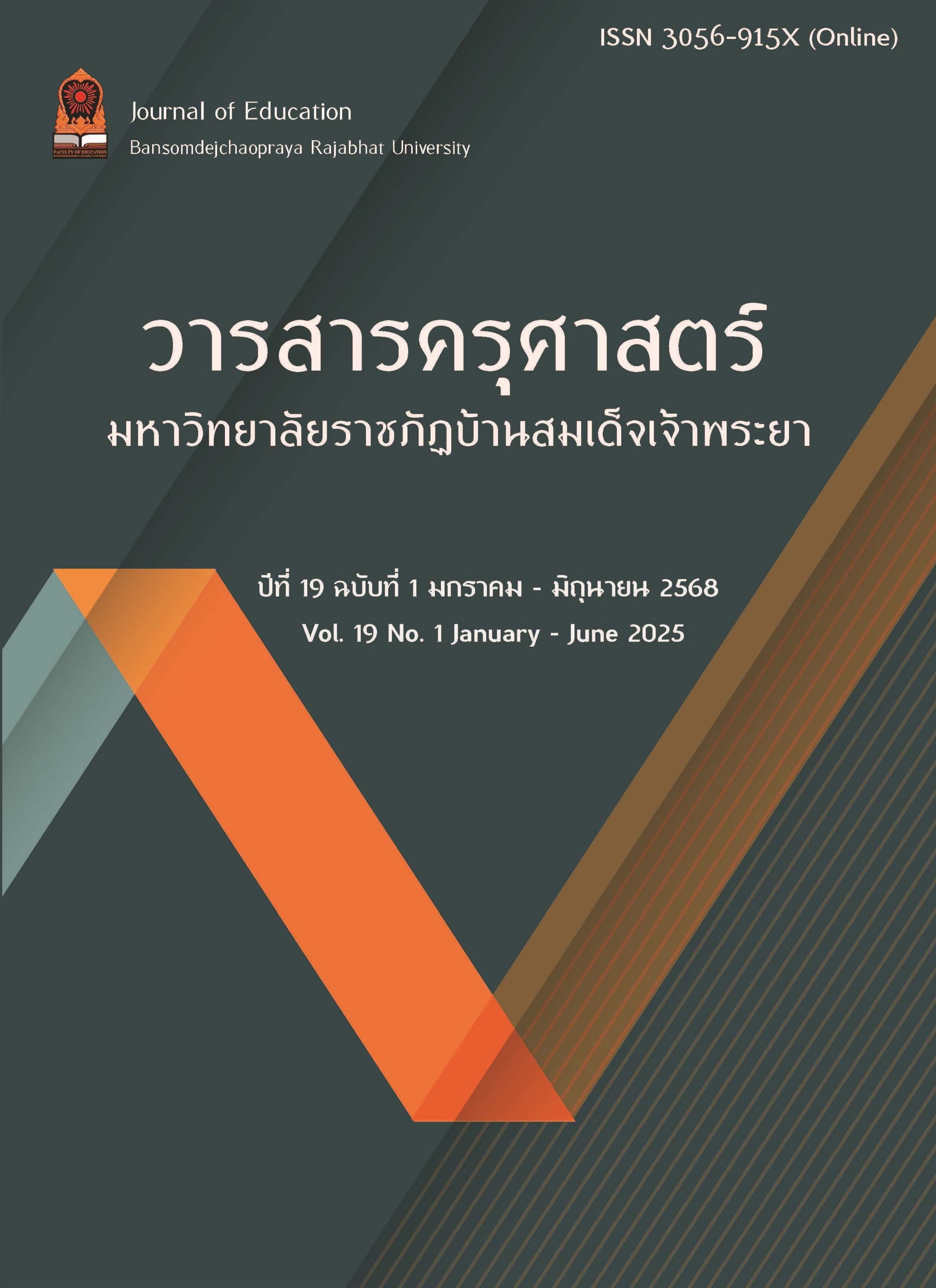A Study of Factors Affecting Digital Quotient of Thailand National Sports University Undergraduate Students
Keywords:
Digital quotient, students, digital media usage, security, National Sports UniversityAbstract
The research objectives were to study 1) the level of digital intelligence of undergraduate students, 2) factors related to the digital intelligence of undergraduate students, and 3) factors influencing the digital intelligence of undergraduate students at the National Sports University, Chonburi Campus. The sample consisted of 200 undergraduate students selected by stratified random sampling. The instruments used were a questionnaire to measure the level of digital intelligence, and data were analyzed using descriptive statistics, correlation analysis, and multiple regression analysis. The results of the research found that 1) undergraduate students had a high level of overall digital intelligence. The factors that received the highest scores were critical thinking, followed by personal data security, and mindful use of technology, respectively. 2) Factors related to students’ digital intelligence were the role of parents in supporting the use of technology, motivation for using cyberspace, digital intelligence-promoting teaching and learning, learning environment, and academic achievement. 3) Factors with significant influence were the role of parents and motivation for using cyberspace, which could predict students’ digital intelligence by 73.8 percent. The results of the research found that the role of parents, teaching and learning management, and motivation for using technology It is an important factor that helps promote digital intelligence in students. Therefore, educational institutions should organize activities to promote digital skills through the curriculum and educate parents about ways to support their children's use of technology to achieve maximum benefit.
Downloads
References
กรมสุขภาพจิต. (2566). รายงานประจำปีกรมสุขภาพจิต ปีงบประมาณ 2566. สืบค้นจาก https://dmh.go.th
ณัฐธินี ชงโค. (2566). การศึกษาปัจจัยที่มีความสัมพันธ์ต่อความฉลาดทางดิจิทัลของนิสิตปริญญาตรีมหาวิทยาลัยมหาจุฬาลงกรณราชวิทยาลัย. (วิทยานิพนธ์ปริญญามหาบัณฑิต, มหาวิทยาลัยมหาสารคาม). สืบค้นจาก http://202.28.34.124/dspace/handle/123456789/2025
นุจรี ลอยหา, พักตร์วิภา โพธิ์ศรี, และอุทิศ บำรุงชีพ. (2563). แนวทางการจัดการศึกษาเพื่อการพัฒนาความฉลาดทางดิจิทัลบนฐานความคิดหลักเศรษฐกิจพอเพียง. วารสารการวิจัยและพัฒนาหลักสูตร, 12(1), 85-101.
นัฐิยา พัวพงศกร. (2563). เผยสถิติเด็กไทย ถูก ‘ไซเบอร์บูลลี่’ หนัก! ค่าเฉลี่ยสูงติดอันดับโลก. สืบค้นจาก https://teroasia.com/news/194261?ref=news
บุญชม ศรีสะอาด. (2554). การวิจัยเบื้องต้น (พิมพ์ครั้งที่ 9). กรุงเทพฯ: สุวีริยาสาส์น.
พัชนา สุวรรณแสน. (2567). ความฉลาดทางดิจิทัลของนักศึกษา มหาวิทยาลัยราชภัฏนครราชสีมา. วารสารราชพฤกษ์, 22(1), 112-128.
พระมหาสายัณห์ เปมสึโล, สำราญ ศรีคำมูล, และสนิท วงปล้อมหิรัญ. (2566). ความฉลาดทางดิจิทัลของนักศึกษาระดับปริญญาตรีในศตวรรษที่ 21. วารสารมหาวิทยาลัยมหามกุฏราชวิทยาลัย, 11(2), 45-58.
ภัทริกา วงศ์อนันต์นนท์. (2562). ปัจจัยที่มีความสัมพันธ์ต่อความฉลาดทางดิจิทัลของนักเรียนระดับอุดมศึกษา. วารสารพฤติกรรมศาสตร์, 24(3), 67-82.
สำนักงานพัฒนาธุรกรรมทางอิเล็กทรอนิกส์. (2566). พฤติกรรมการใช้อินเทอร์เน็ตของคนไทย ปี 2566. สืบค้นจาก https://etda.or.th
อรัญ ซุยกระเดื่อง. (2562). ปัจจัยเชิงสาเหตุที่ส่งผลต่อการรู้เท่าทันดิจิทัลของนักเรียนมัธยมศึกษาตอนปลายในเขตภาคตะวันออกเฉียงเหนือ: การวิเคราะห์พหุระดับ. วารสารการวิจัยทางการศึกษา, 18(2), 121-138.
DQ Institute. (2019). Digital intelligence: A comprehensive framework for digital literacy, skills, and readiness. Retrieved from https://www.dqinstitute.org
Hair, J. F., Black, W. C., Babin, B. J., & Anderson, R. E. (2019). Multivariate data analysis (8th ed.). Pearson.
Gao, X., & Yu, Z. (2024). Management of Information and Personalized Guidance for Vocational College Students in the Digital Era. International Journal of New Developments in Education, 6(5). https://doi.org/10.25236/ijnde.2024.060519
Livingstone, S., Stoilova, M., & Nandagiri, R. (2021). Children's data and privacy online: Growing up in a digital age. New Media & Society, 23(12), 3647–3664. Retrieved from https://doi.org/10.1177/14614448211012778
Miller, D., Costa, E., Haynes, N., McDonald, T., Nicolescu, R., Sinanan, J., Spyer, J., Venkatraman, S., & Wang, X. (2020). How the world changed social media. Retrieved from https://doi.org/10.2307/j.ctt1g69z
Downloads
Published
How to Cite
Issue
Section
License
Copyright (c) 2025 Faculty of Educaion Bansomdejchaopraya Rajabhat University

This work is licensed under a Creative Commons Attribution-NonCommercial-NoDerivatives 4.0 International License.
บทความที่ได้รับการตีพิมพ์เป็นลิขสิทธิ์ของคณะครุศาสตร์ มหาวิทยาลัยราชภัฏบ้านสมเด็จเจ้าพระยา
ข้อความที่ปรากฏในบทความแต่ละเรื่องในวารสารวิชาการเล่มนี้เป็นความคิดเห็นส่วนตัวของผู้เขียนแต่ละท่านไม่เกี่ยวข้องกับมหาวิทยาลัยราชภัฏบ้านสมเด็จเจ้าพระยา และคณาจารย์ท่านอื่นๆในมหาวิทยาลัยฯ แต่อย่างใด ความรับผิดชอบองค์ประกอบทั้งหมดของบทความแต่ละเรื่องเป็นของผู้เขียนแต่ละท่าน หากมีความผิดพลาดใดๆ ผู้เขียนแต่ละท่านจะรับผิดชอบบทความของตนเอง



